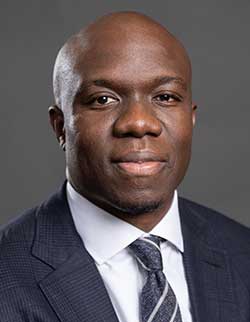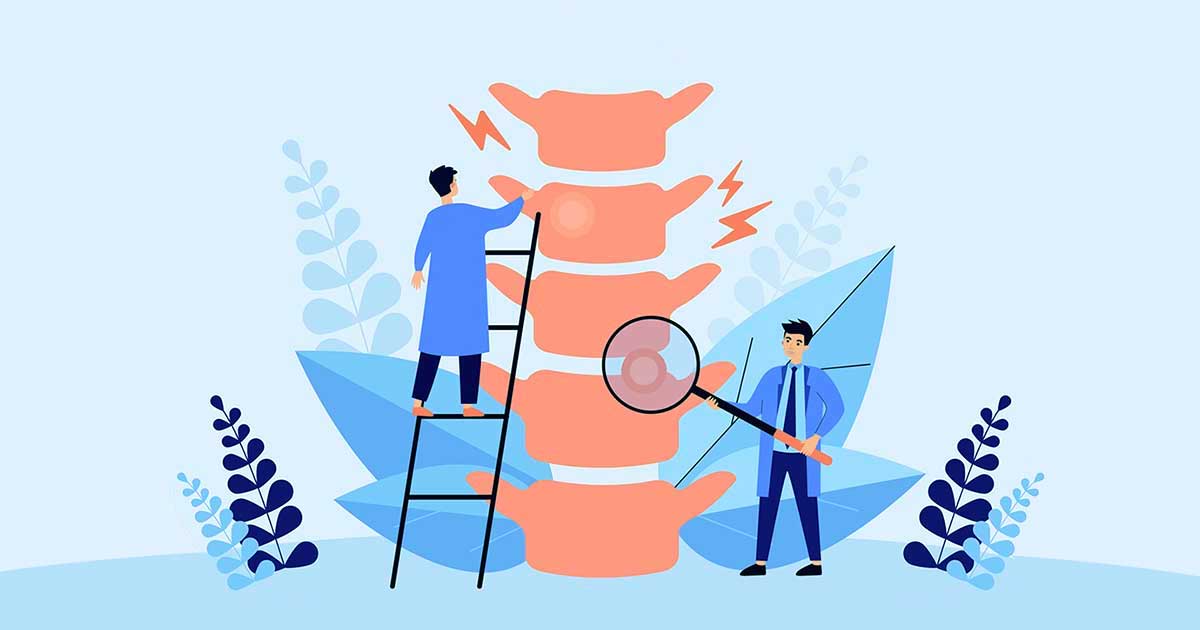What to Do about Back Pain
Advice to improve your movement, fitness, and overall health from the world's #1 in orthopedics.
Back pain can be debilitating, and most people have experienced it at some point in their lives. It can be hard to know when back pain is concerning or when you can take care of it at home. “Back pain is really generalized, and many different things can cause back pain, the most common being muscular pain,” explains Gbolabo Sokunbi, MD, a spine surgeon at HSS.

For starters, there are different areas of the back and spine that can be affected by pain and inflammation. “The spine is split up into different portions — the cervical spine, which is your neck; the thoracic spine, which is your upper back; your low back/lumbar spine; and then your sacral/coccyx area, which connects to the pelvis,” says Dr. Sokunbi. Your pain may have different qualities and symptoms depending on where in the back you feel it. “Symptoms could include burning, numbness, tingling, spasms, stiffness and weakness in surrounding areas,” among others, Dr. Sokunbi explains.
As you age, degenerative conditions such as arthritis can contribute to back pain. Sometimes, things like stress fractures or conditions affecting the bones, such as osteoporosis, can be the culprit. And other times, in more serious cases, issues with the nerves and spinal cord can cause problems that result in back pain. But usually, your muscles, ligaments, joints and overall spinal alignment are the culprits.
Treating Back Pain at Home
Back pain that is caused by a sprain or strain can be taken care of at home. “Believe it or not, most of the time, if you do nothing, back pain gets better over the course of several days or weeks,” Dr. Sokunbi says. The best thing you can do is rest your back and incorporate some light stretching into your daily routine.
If you’re looking for some additional at-home remedies to try, “over-the-counter anti-inflammatory medications like Ibuprofen can help and, for some people, ice or heat,” Dr. Sokunbi adds.
If your pain improves using these home remedies, it’s safe to assume you won’t need additional care from a specialist, but it’s good to monitor your condition and note if your pain returns.
When to See a Doctor for Back Pain
Other times, back pain can be a cause for concern. Some red flags are:
- back pain that is prolonged or coincides with you feeling generally unwell, such as having fever, chills, loss of appetite, or you’re not sleeping
- persistent back pain that travels to other areas of your body such as into your hip, buttocks, leg, or foot
Dr. Sokunbi explains that some situations could be serious enough to go to the emergency department: “If you have the inability to urinate properly or incontinence of bowel or bladder, these would be serious red flags.” One of the other things doctors worry about is trauma or severe muscle weakness. If you start to trip over your foot or can’t lift your leg properly, this would be reason to seek emergency help.
It can be hard to know when to seek care from your primary care doctor versus when to see a specialist for back pain. For most people, your primary care doctor is a good place to start. “The primary care doctor is usually the provider that most people would touch base with first when they have symptoms that are not responding to home remedies,” Dr. Sokunbi says. From that point, they can assess with a history and physical exam and determine whether you need imaging studies to see what’s going on, or if you need a referral to a specialist such as a spine surgeon. In the vast majority of cases, treatment for spinal conditions can be initiated by physical therapists, primary-care doctors and non-operative spine experts. “Surgical intervention is typically considered a last resort after conservative management options have been exhausted. Once this has occurred, a referral to a surgeon is often provided,” he explains.
Preventing Back Pain
While there is not always a way to prevent back pain caused by more serious conditions, there are a few things you can do to prevent run-of-the-mill aches and issues. First is to “maintain a healthy weight and avoid nicotine products and smoking, as this has been shown to accelerate degeneration of spinal discs,” Dr. Sokunbi suggests. The tips below may also help.
- Pay attention to your posture. Your posture is your first line of defense against back pain. When sitting, make sure your back is straight and your neck and shoulders are pulled back. Sometimes, adding a cushion behind your lower back can help give you some extra support. When standing, make sure your weight is balanced evenly on both feet.
- Use proper body mechanics. Body mechanics are the way you move when performing everyday activities and tasks. For example, when you bend to pick something up off the floor, use your legs to squat down instead of bending over at the waist. When lifting something heavy, try not to twist your body. Use your leg muscles and abdominal core to help you lift.
- Avoid prolonged sitting. Sitting for too long can cause unnecessary strain on the neck and lower back. If you work at a desk job and sit for prolonged periods of time, try to get up and walk around every so often to help balance your posture. If you do have to sit for an extended period, such as driving long distances, consider trying a lumbar support cushion for your back.
- Break up repetitive tasks. Doing the same motions every day can cause strain on the back from overuse of muscles. If you’re performing the same tasks every day, such as looking at a computer or typing on a keyboard, try to take breaks and modify these tasks. For example, make sure your computer monitor is at the correct height so you are not straining your neck, and adjust it from time to time if you start feeling any discomfort.
- Exercise. Getting your body in shape is a great way to fend off back pain. However, you’ll want to make sure to stretch often and wear well-fitting, supportive shoes, or you may cause more issues than you cure. You’ll also want to pay attention to your body mechanics while exercising to avoid any awkward or potentially dangerous postures.
Published 3/8/2022




